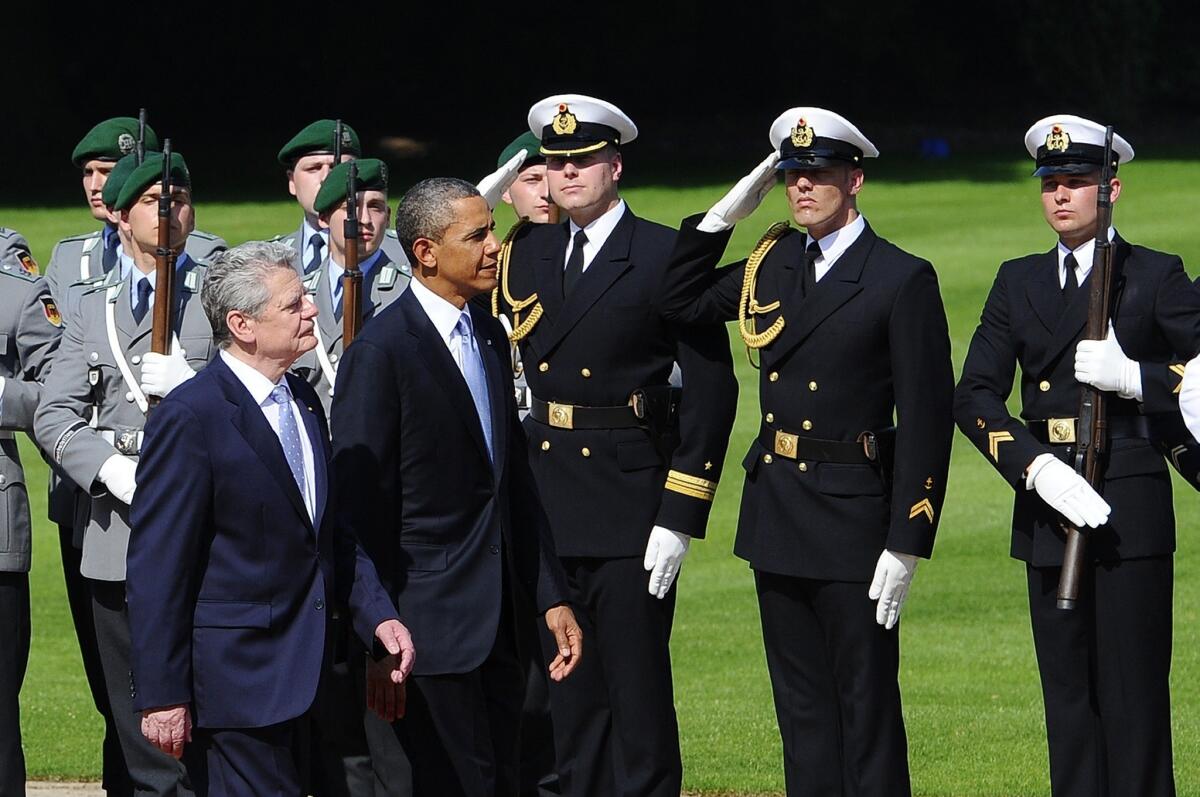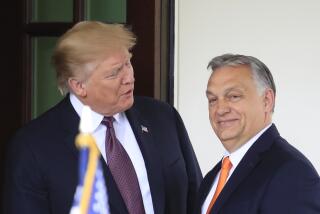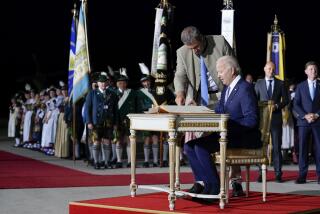Obama to call for U.S.-Russia nuclear arms reduction

- Share via
BERLIN -- Standing at a symbol of democracy’s triumph over communism, President Obama will announce his hopes to further reduce the U.S. nuclear arsenal as he tries to outline a vision for a post-Cold War “national and citizen activism,” officials said.
In a speech at the Brandenburg Gate on Wednesday, Obama will say he wants to go beyond reductions outlined in the New START treaty, seeking an additional one-third cut in the number of deployed strategic nuclear warheads in the U.S. arsenal, if the Russians agree to do the same, a senior administration official said Wednesday.
Obama will, at least for a day, revive the topic in a high-profile speech aimed at historians and legacy watchers, as well as a European public increasingly wary of some of the president’s foreign policies. News of the scope and scale of U.S. foreign surveillance programs has become major news in Germany, adding to a short list of disappointments for a population that overwhelmingly embraced the American president.
For his speech, Obama has chosen a favorite city and backdrop for U.S. presidents aiming for high rhetoric and sweeping statements on the future of transatlantic relations. His remarks will come almost 50 years to the day of President Kennedy’s declaration of solidarity with this once-divided city in his “Ich bin ein Berliner” speech. Presidents Reagan and Clinton also made major speeches at the Brandenburg Gate, which was once cut off by the Berlin Wall.
Obama’s focus on nuclear weapons picks up a notion he raised in his first attempt at a big Berlin moment. As a candidate in 2008, speaking before a crowd of more than 200,000, Obama declared that “this is the moment to begin the work of seeking the peace of a world without nuclear weapons.”
In his sequel to that speech on Wednesday, Obama’s remarks will demonstrate the difficulty of achieving such a goal. The president will urge the Senate to ratify the Comprehensive Nuclear Test Ban Treaty, although previous calls have found little traction in the Senate. He’ll also announce plans to attend another summit on securing nuclear material in 2014 in the Hague. Obama initiated the series of international summits in 2009.
Administration officials say Obama’s message of disarmament will be one element of a larger speech.
“The message he would like to send is that sometimes it’s easy to think that history is behind us, essentially. The Wall is down. There’s not a threat of global nuclear war. The threats that we do face are far more distant,” deputy national security advisor Ben Rhodes said Tuesday. Obama, he said, will argue that “the exact same level of citizen and national activism that was characterized in the Kennedy speech and in the Cold War needs to be applied to the challenges we face now.”
Obama’s remarks will follow a meeting and news conference with German Chancellor Angela Merkel. The visit, his first to Berlin as president, caps a three-day European trip that began in Northern Ireland, where he attended a summit of Group of 8 industrialized nations.
ALSO:
Mali signs peace deal with Tuareg rebels
G-8 leaders vow to go after global tax cheats
Obama welcomes Taliban assent to Afghanistan talks
More to Read
Sign up for Essential California
The most important California stories and recommendations in your inbox every morning.
You may occasionally receive promotional content from the Los Angeles Times.











